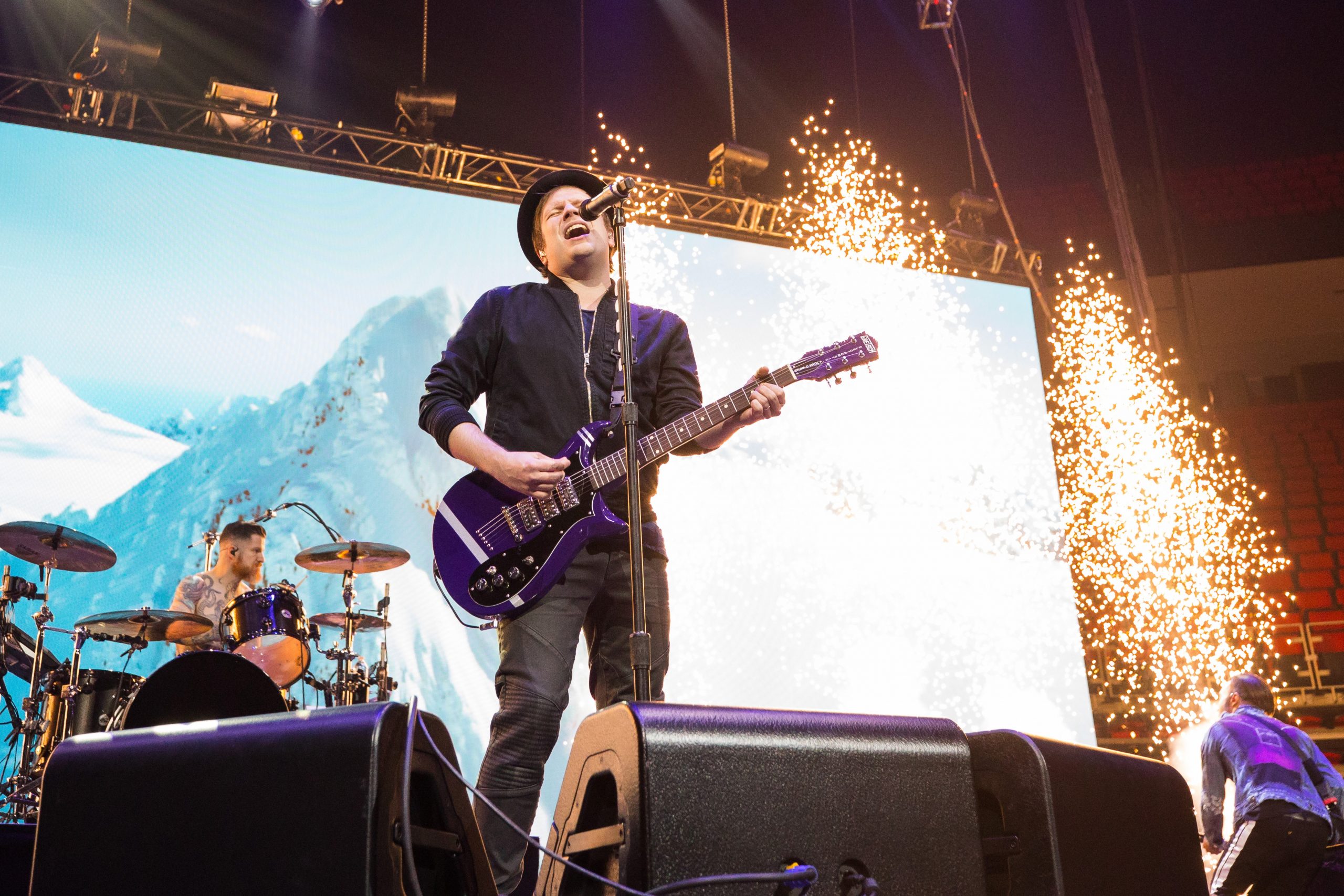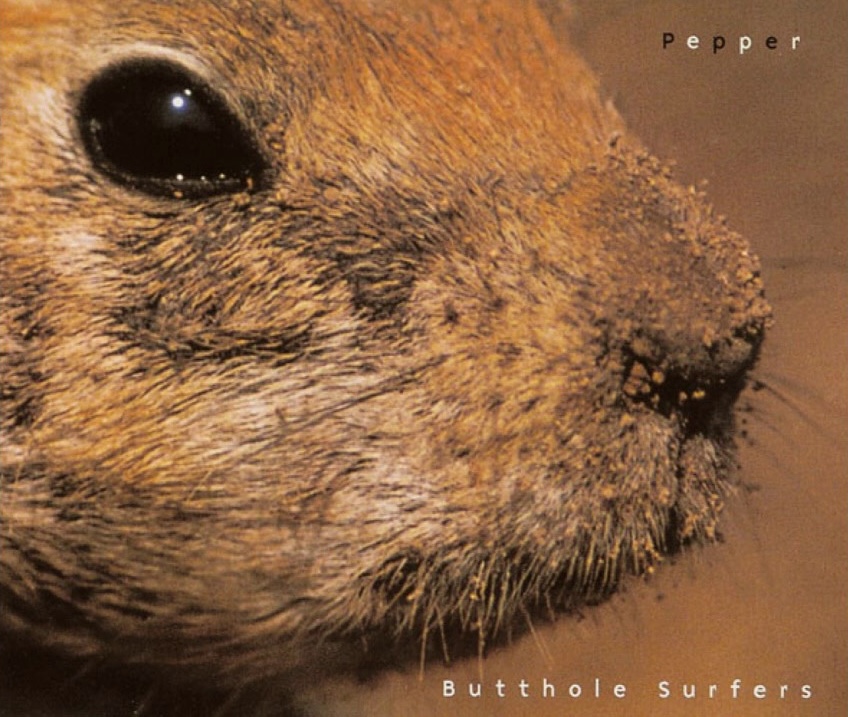"It would honestly be bullshit for us to put out something that we didn't think was our very, very fucking best work," Fall Out Boy's Pete Wentz told the crowd at Cleveland's Quicken Loans Arena during the first night of the band's M A N I A tour. The bassist was referring to the fact that Fall Out Boy's seventh studio album (also called M A N I A) had been pushed to January 19, 2018 from its intended September 2017 release.
Fans clearly weren't bothered by the delay, however. During Jaden Smith's opening set, incredibly long merch lines snaked through the concourse, dwarfing any lines at the concession stands. A vendor selling drinks drew chuckles by his futile (but good-hearted) attempts to peddle beer, as the audience skewed young, save for the parents spotted walking around with their kids. Enthusiasm was also not in short supply. Once Fall Out Boy took the stage, a guy wearing a fluorescent orange muscle tee spent multiple songs thrashing around like he was at a hardcore show, while an elementary schooler there with what looked like his mom was thrilled to dance around to the frenzied pogo "American Beauty/American Psycho."
Despite the size of the venue, seeing Fall Out Boy in 2017 isn't that much different than seeing the band in previous years. Fan favorites "Sugar, We're Goin' Down" and "Grand Theft Autumn/Where is Your Boy Tonight" were loud, rousing sing-alongs. Vocalist/guitarist Patrick Stump still sported a jaunty hat, Wentz took care of stage banter—including a subtle, local-tailored nod to the fact 2016 World Series competitors the Cleveland Indians and Chicago Cubs missed out on the series this year—and the set ended with the traditional concert-closer, Take This To Your Grave's "Saturday."
However, in other ways, Fall Out Boy's status as pop elites was difficult to miss. The production was elaborate, with a gigantic LED video screen, a catwalk that spanned the length of the arena, and generous amounts of pyro, lasers and ceiling confetti. The '80s-tinted "Immortals," which appeared in Disney's Big Hero 6, came paired with video footage from the movie. "Uma Thurman" was kitschy and kicky thanks to its prominent sample of The Munsters theme. And the new song "The Last Of The Real Ones" had Stump alternating between pounding out repeating rhythmic stutters at the piano and then leaping up to sing the chorus, a splashy electro-rock stomp with dance grooves.
And make no mistake: Since Fall Out Boy returned from a nearly four-year hiatus in 2013, they've adapted quite well to the modern music landscape. The band has six RIAA-certified platinum singles, with three of these ("My Songs Know What You Did In The Dark (Light 'Em Up)," "Centuries" and "Uma Thurman") certified multi-platinum. Their two most recent albums (2013's Save Rock And Roll and 2015's American Beauty / American Psycho) are also certified platinum, and they play outdoor sheds and arenas, something few formed-post-2000 modern rock bands attempt these days.
Of course, these pop overtures don't always come with perfect polish. At one point during the Cleveland show, Stump ended up alone at the far end of the arena and had to jog back to the main stage to start the next song. A three-song set at a B-stage—consisting of two square platforms that could be elevated in the air, which made them resemble the oversized Super Mario Bros. 3 outdoor level — felt shoehorned into the set. Stump looked a little nervous to move from the mic (understandably, as he was hovering at eye level with the steep upper sections of the arena on a platform with no railings), which made usually energetic, brisk hits such as "Dance, Dance" and "Thnks Fr Th Mmrs" feel oddly lethargic.
[videoembed size="full_width" alignment="center"][/videoembed]
Some of this awkwardness can be chalked up to start-of-tour glitches. Stump told the crowd he missed the show rehearsals in Cleveland due to a "family emergency," which meant he was running through the concert for the first time in front of an audience. But these imperfections are also what make Fall Out Boy, well, Fall Out Boy. Nearly 15 years after the band emerged from the Chicago suburbs, the musicians still seem like unlikely rock stars. In part that's their demeanor, which remains low-key and often goofy. But that's also because Fall Out Boy resist being pigeonholed.
"We aren't the last rock band," Stump told Rolling Stone in 2015. "But we're the last rock band that doesn't think that pop is a four-letter word."
That's always been the case. With the release of 2005's From Under The Cork Tree, Fall Out Boy crashed the Top 40 on the strength of chugging guitars, cryptic romantic lyrics and Stump's distinctive, vibrato-trembled nasal croon. The commercial surge was a byproduct of good timing. Dashboard Confessional and Jimmy Eat World had made mainstream inroads; Yellowcard and New Found Glory were on the alternative music charts; and Saves the Day and Green Day had made their most mature records yet. But Fall Out Boy were younger — Stump and guitarist Joe Trohman were barely older than their teenaged fans — and the band's sugary pop-punk was hungry and clever.
Instead of churning out more of the same, Fall Out Boy quickly started evolving. Released in 2007, the futuristic Infinity On High reimagined what modern pop-punk could be, with its nods to theatrical rock, jaunty new wave, giddy power pop and stark piano balladry. The streak continued on 2008's Folie à Deux, a record received warmly by critics that was considered a commercial disappointment, despite gigantic leaps in songwriting that encompassed smoldering soul ballads (the Elvis Costello-featuring "What A Catch, Donnie"), hip-hop-tinted synthrock ("Tiffany Blews") and a stadium-sized take on their emo-pop ("Disloyal Order Of Water Buffaloes").
[videoembed size="full_width" alignment="center"][/videoembed]
Such genre-hopping is second nature to the band, largely because the band members are musical omnivores. A drummer by trade, Stump grew up loving Prince, David Bowie, Elvis Costello and Michael Jackson. (Later, he held his own while collaborating with Daryl Hall.) Prior to the release of a hardcore EP, 2013's Pax-Am Days, Wentz namechecked a host of influences: Metallica’s Master Of Puppets, Gorilla Biscuits, Los Crudos, the Descendants, Screeching Weasel, and Earth Crisis. Drummer Andy Hurley — who's continued to play in a whole mess of hardcore bands outside of Fall Out Boy — is currently in the vegan hardcore band Sect with Earth Crisis guitarist Scott Crouse. Midwest emo bands such as the Get Up Kids were also early inspirations.
This desire to evolve and continue collapsing genre boundaries didn't wane during their hiatus; in fact, Fall Out Boy was determined not to coast on nostalgia when they decided to reunite. "We didn't want to come back just to bask in the glory days and, like, and collect a few checks and pretend ... and do our best 2003 impersonation," Stump told MTV News in 2013. "We wanted to do something that was us now. And if it weren't right, we weren't going to do it."
This was a bold move: Although '00s contemporaries such as Panic! At The Disco and Paramore have been embraced for their sonic progressions, Fall Out Boy's attempts at evolution have tended to be greeted with skepticism. In fact, the band's unwillingness to stay in their lane has always caused a disproportionate amount of anger — and weirdly personal anger at that. Fall Out Boy's mere existence seems to bother certain detractors.
"We've been saddled with several disparaging genre things," Stump told Rolling Stone in 2015. "'Oh, they're this fucking pop-punk band,' or 'They're this fucking emo band – these guys suck,' or 'They're this fucking stadium-rock band — these guys suck.' Nobody can decide why we suck – to me, that means we're doing the right thing."
That self-awareness is both a blessing and a curse. On the one hand, since everything they do is scrutinized and criticized, the members of Fall Out Boy are freed up do whatever they want — collaborate with Missy Elliott on a cover of the Ghostbusters theme, tour with Wiz Khalifa and Hoodie Allen, or unleash a metalcore goof called "Who's The (Bat)man." The downside is that Fall Out Boy is more sensitive to vitriol and negativity, and is often put in a defensive stance. For example, back in 2009, Stump defended the decision to have rapper 50 Cent open some tour dates.
"We've encountered a little bit of negative feelings about it," Stump told Billboard, "but I think that you should challenge your audience a little bit. And I think the reality is that, okay, if you don't like 50 Cent, if you're that stuck-up that you're going to stand there and hate him actively, then go to the concession stand during [his set]. Go get a T-shirt or go to the bathroom if that's how you feel. Otherwise, challenge yourself."
Later that year, Fall Out Boy infamously went on hiatus after Folie à Deux, making the "Disloyal Order Of Water Buffaloes" lyric "Nobody wants to hear you sing about tragedy," feel that much more poignant. In a 2012 letter, "We Liked You Better Fat: Confessions Of A Pariah," Stump described how "audiences openly hated" Folie à Deux. "Now, that’s not to say it didn’t have its fans, but at no other point in my professional career was I nearly booed off stages for playing new songs. Touring on Folie was like being the last act at the Vaudeville show: We were rotten vegetable targets in Clandestine hoodies."
Although fans welcomed the band with open arms in 2013, vestiges of this hatred remained. "Fall Out Boy Is Back and They Still Suck," screamed the headline of a 2015 Daily Beast article. The dek wasn't much kinder: "The band’s album American Psycho / American Beauty dethroned Taylor Swift at the top of the Billboard charts. These emo boys can’t be rock and roll’s saviors." This framing in particular illuminates the underlying sexism dogging Fall Out Boy's reception. Back in the '00s, the band's fanbase skewed heavily toward teenage girls and young women, two groups whose taste and expertise are typically dismissed, while Wentz's penchant for "guyliner" turned into a punchline laced with homophobia. (That the e-word also became a pejorative is a whole 'nother ball of wax.) Fall Out Boy never resorted to rigid gender stereotypes, which made them both enormously appealing and a magnet for hate.
After all, when a band can't be neatly pigeonholed, and isn't afraid of being vulnerable, that makes people uncomfortable. Not that Fall Out Boy cares; upending expectations is built into the band's DNA. If they're not doing intriguing covers — Michael Jackson's "Beat It" with John Mayer, The Jungle Book's "I Wan'na Be Like You" — they're collaborating with big-name DJs (Steve Aoki) or doing a remix album dominated by hip-hop stars. Fall Out Boy don't want to conform or get stuck in a rut.
[videoembed size="full_width" alignment="center"][/videoembed]
This too hasn't always been successful. "Centuries" in particular drew ire because of its ubiquity in the sports world, namely ESPN using the song as the theme song for its college football playoffs coverage in 2014. "We realize that it was to the point where it was getting under people’s skin," Wentz said. "We didn't really know that’s how it was going to be, because obviously this was the first college playoffs and stuff. But, at the same time, there’s was a lot of people who probably wouldn’t have heard of our band who have heard of it. Hopefully, we didn’t annoy you too badly."
At the M A N I A tour in Cleveland, Fall Out Boy turned "Centuries" into a political statement at which some football fans might bristle: Footage of quarterback Colin Kaepernick and NFL teams kneeling to protest the national anthem alternated with footage of Muhammad Ali as the band performed the song. Rather than a blaring Jock Jam, "Centuries" turned into a pointed expression of solidarity.
These days, Fall Out Boy itself is also more of a unified entity. "Before we took the time off, we were having a hard time communicating with each other," Wentz said in a 2015 interview. "Not a hard time communicating with each other -- we weren't communicating with each other." In a Rolling Stone interview from that same year, he owned up to his role in this breakdown. "I literally spent my 20s as the most selfish person that I know. I didn't have the capacity for understanding other people's time and empathy for what other people thought about things."
Post-return, although each member of Fall Out Boy has his own cult of personality, the band is more balanced and grounded. That was most evident at the Cleveland show: Stump in particular exuded confidence as he ran around the stage and showed off some fleet-footed frontman moves — and Hurley was given the spotlight to do a jaw-dropping, furious drum solo — but no one member dominated the night. In fact, there were little gestures that revealed their camaraderie: Stump played guitar for much of the set, which led to a lighthearted duel with Trohman during "Sugar We're Goin' Down," while the latter added some droning guitar on "Alone Together" that enhanced the song.
Fall Out Boy's days of being compared to Saves The Day are long gone — but the band's enduring success comes from their us-against-the-world mentality. Despite the arena trappings, in Cleveland, the quartet more often than not came off like a group woodshedding in a club or garage somewhere. In hindsight, the genre agnosticism of '00s Fall Out Boy — and, by extension, the whole '00s Fueled By Ramen crew, like Cobra Starship and Gym Class Heroes — was more forward-thinking than maybe we knew at the time. Sure, it's perfectly natural to have fanbase attrition when a group decides to go in different sonic directions, but anyone who wrote off Fall Out Boy for being one particular thing may want to reconsider their stance.






